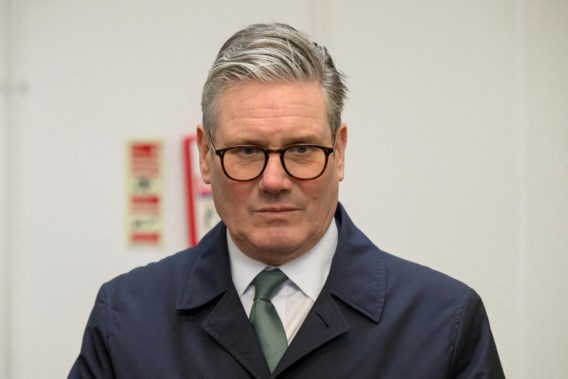UK Willing to Deploy Troops to Ukraine as Part of Peace Agreement
British Prime Minister Keir Starmer has indicated a willingness to send British troops to Ukraine as part of a potential peace agreement. This comes following declarations from other European nations, including Germany and Poland, who are also open to contributing military personnel to a future peacekeeping force.
Securing Long-Term Peace
Starmer emphasizes the paramount importance of establishing lasting peace in Ukraine, stating in an op-ed for The Daily Telegraph that it is indeed ”essential if we want to deter Putin from further aggression in the future.” He acknowledged the gravity of risking British lives, saying, “it is a big obligation, but we must be ready to make our contribution for Europe”.
Leading the Way in Security Guarantees
The UK is prepared to take a leading role in formulating safety guarantees for Ukraine. This commitment includes ongoing support for the ukrainian military,with the UK already pledging £3 billion (approximately €3.6 billion) annually until 2030. Additionally, starmer announced a willingness to contribute troops to a peacekeeping force if necessary.
This marks the first time the UK has explicitly stated its willingness to deploy ground troops to Ukraine. Previously, Starmer had expressed support for assisting in the implementation of a peace agreement.
Cautious Dialog
While several European nations have signaled their openness to contributing to a potential peacekeeping force in Ukraine, some experts argue that discussions surrounding troop deployment are premature. The complexities surrounding a ceasefire agreement, the potential for ongoing conflict, and the need for clear terms of engagement require careful consideration before any concrete decisions are made regarding troop deployments.
Looking Ahead
The possibility of British troops being deployed to Ukraine represents a meaningful shift in the UK’s stance on the conflict. Continued dialogue and diplomacy are crucial to ensuring a peaceful resolution, while the potential for international cooperation in establishing a peacekeeping force remains a key point of discussion.
Could European Troops Head to Ukraine? Leaders Discuss Potential Involvement
The possibility of European ground troops being deployed to Ukraine sparked intense debate following a call from Labor leader sir Keir Starmer for such a move. While some nations remain cautious, others have expressed openness to the idea.
Swedish Foreign Minister Maria Malmer Stenergard stated that “nothing is excluded” in terms of support for a peace agreement,including the deployment of ground troops. “We must now first negotiate a fair and enduring peace agreement that respects international law and Ukraine,” Stenergard emphasized in an interview with Swedish public broadcaster. She added, “But that agreement must also ensure in the first place ‘that Russia cannot withdraw to strengthen the troops and then attack Ukraine or another country again within a few years.'”
Germany’s stance on troop deployment was more direct. A spokesperson for the German Ministry of Defense stated, “If the correct framework is created, Germany will not be shot for that.” Though, German Chancellor olaf Scholz cautioned against premature discussions, saying in an interview with Süddeutsche Zeitung, “We are a long way away from that.”
Polish Prime Minister Donald Tusk firmly ruled out sending Polish soldiers to Ukrainian territory. Yet, he pledged to offer logistical and political support to countries willing to contribute troops. He reaffirmed Poland’s commitment to Ukraine through “organizational, financial, humanitarian and military help,” echoing previous efforts.
The debate surrounding European troop involvement in Ukraine underscores the complex realities of the conflict. While nations grapple with the potential risks and benefits, the ultimate goal remains achieving a lasting and peaceful resolution.
Macron Pursues Diplomatic Solutions for Ukraine War
French President Emmanuel Macron is intensifying efforts to broker a diplomatic solution to the ongoing conflict in Ukraine. Just a year after suggesting the possibility of western ground troops being deployed to Ukraine, Macron has shifted his focus to direct negotiations with Russia.
Macron recently convened a meeting with leaders from key European nations in Paris, emphasizing the need to address European security concerns. Now, his diplomatic push extends to the United States, where he aims to coordinate a unified approach to engaging with Russia.
“The main European countries” were called together in Paris on Monday afternoon to discuss “European safety,” according to Macron. This meeting highlights the growing urgency to find a peaceful resolution to the war in Ukraine.
While the potential deployment of ground troops was once a topic of discussion, Macron’s current strategy underscores the importance of diplomatic channels in navigating this complex crisis.His efforts to engage directly with Russia reflect a commitment to exploring avenues for de-escalation and achieving a lasting peace.
Challenges and Opportunities
Direct negotiations with Russia present significant challenges. The Kremlin’s persistent military actions and its demands for territorial concessions stand in stark contrast to Ukraine’s aspirations for sovereignty and territorial integrity. Reconciling these conflicting positions will require deft diplomacy and a willingness from both sides to compromise.
despite these obstacles, Macron’s diplomatic initiative offers a glimmer of hope. By fostering dialogue and facilitating interaction between warring parties, he aims to create an habitat conducive to peace negotiations.
International support
Macron’s diplomatic endeavors are likely to garner international support.The international community has overwhelmingly condemned Russia’s invasion of Ukraine and has rallied behind Ukraine’s defense.A united front of countries urging peace negotiations could create pressure on both sides to seek a resolution.
Finding a peaceful resolution to the war in Ukraine will require sustained diplomatic efforts,a willingness to compromise from all parties involved,and the unwavering support of the international community. Macron’s initiative represents a crucial step forward in this ongoing process.
How might a troop deployment impact the relationship between NATO adn Russia ?
UK Willing to Deploy Troops to Ukraine: Interview with Defense Analyst
Amid growing international concern over the ongoing conflict in Ukraine, British Prime Minister Keir Starmer’s recent declaration that the UK could send troops as part of a peacekeeping force has sparked widespread discussion.
archyde News spoke to Dr. Eleanor Vance, a leading defence analyst, to delve deeper into the implications of this statement. Dr. Vance specializes in international security and conflict resolution.
Q: Dr. Vance, Prime Minister Starmer’s statement marks a meaningful shift in UK policy. What factors could be driving this potential willingness to deploy troops to Ukraine?
Dr. Vance: Indeed, this is a pivotal moment. While the UK has provided substantial military aid to Ukraine,committing ground troops represents a significant escalation.Several factors likely contribute to this shift. Firstly, there’s growing international pressure to prevent further escalation and find a lasting solution. Secondly, recent battlefield developments may be influencing perceptions of the conflict’s trajectory. Lastly,there’s likely an element of demonstrating unwavering support for Ukraine’s sovereignty and deterring further russian aggression.
Q: Many experts argue that deploying troops is a risky proposition. What are the potential downsides?
Dr. Vance: Absolutely. Deploying troops carries inherent risks. Firstly, there’s the possibility of escalating the conflict, potentially drawing NATO into direct confrontation with Russia. Secondly, peacekeeping missions often prove complex and fraught with challenges, requiring meticulous planning and coordination. deploying troops inevitably carries risks to the lives of those involved.It’s crucial that any decision regarding troop deployment is carefully considered, factoring in all potential consequences.
Q: The UK isn’t alone in considering troop deployments. Several European nations, including Germany, are expressing openness. Could a united European front make a difference?
Dr. Vance: Certainly, a united European front would substantially impact the situation. A collective commitment to supporting Ukraine sends a powerful message to russia, demonstrating international resolve. Furthermore, coordinating troop deployments and providing logistical support strengthens collective security efforts.However, achieving unity amongst European nations can be challenging, as countries often have diverse perspectives and priorities.
Q: looking ahead, what do you believe is the most critical step towards achieving peace in Ukraine?
Dr. Vance: Achieving lasting peace in ukraine demands a multifaceted approach. Diplomatic dialog remains paramount. Finding a negotiated settlement that addresses the legitimate security concerns of all parties involved is essential. Alongside diplomacy, continued international pressure on Russia to cease hostilities is crucial. Ultimately, ensuring Ukraine’s sovereignty, territorial integrity, and the safety of its people should be the guiding principles of any solution.
This interview offers valuable insights into the complexities surrounding potential troop deployments in Ukraine. As the situation continues to evolve, continued dialogue and thoughtful analysis remain essential for navigating this challenging landscape.
Dr. Vance: Absolutely. Deploying troops carries inherent risks. Firstly, there’s the possibility of escalating the conflict, potentially drawing NATO into direct confrontation with Russia. Secondly, peacekeeping missions often prove complex and fraught with challenges, requiring meticulous planning and coordination. deploying troops inevitably carries risks to the lives of those involved.It’s crucial that any decision regarding troop deployment is carefully considered, factoring in all potential consequences.
Q: The UK isn’t alone in considering troop deployments. Several European nations, including Germany, are expressing openness. Could a united European front make a difference?
Dr. Vance: Certainly, a united European front would substantially impact the situation. A collective commitment to supporting Ukraine sends a powerful message to russia, demonstrating international resolve. Furthermore, coordinating troop deployments and providing logistical support strengthens collective security efforts.However, achieving unity amongst European nations can be challenging, as countries often have diverse perspectives and priorities.
Q: looking ahead, what do you believe is the most critical step towards achieving peace in Ukraine?
Dr. Vance: Achieving lasting peace in ukraine demands a multifaceted approach. Diplomatic dialog remains paramount. Finding a negotiated settlement that addresses the legitimate security concerns of all parties involved is essential. Alongside diplomacy, continued international pressure on Russia to cease hostilities is crucial. Ultimately, ensuring Ukraine’s sovereignty, territorial integrity, and the safety of its people should be the guiding principles of any solution.
This interview offers valuable insights into the complexities surrounding potential troop deployments in Ukraine. As the situation continues to evolve, continued dialogue and thoughtful analysis remain essential for navigating this challenging landscape.



